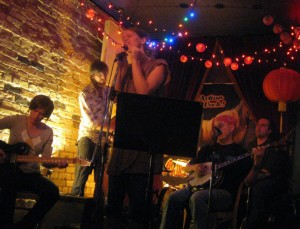Music is essentially about time, about the way a note or a beat picks up on those that went before and sets up those that will come after.
A metronome responds to this essential temporality. It produces a rigid beat to which a musician can refer in order to hold firmly to the temporal “skeleton” of the piece being played: the metronome defines the core temporal flow that organizes the timing of the notes and the beats in the tune.
The metronome marks out the “time” of the piece, but it does it very abstractly and rigidly, very “mathematically.” There is also another time of the piece, a concrete time.
 When one is truly playing (or listening) to a piece of music, one does not count “1, 2, 3, 4” in one’s head to know where the beats fall. Instead, one feels the beats: the rhythm is in the music, not imposed upon it, and one feels the time by getting into the music, not by going outside it to an independently defined number line.
When one is truly playing (or listening) to a piece of music, one does not count “1, 2, 3, 4” in one’s head to know where the beats fall. Instead, one feels the beats: the rhythm is in the music, not imposed upon it, and one feels the time by getting into the music, not by going outside it to an independently defined number line.
And what happens when one plays “by feel” rather than by listening to the metronome? Sometimes the music speeds up; sometimes it slows down. The time, that is, is wrong from the point of view of the metronome, but the time is right from the point of view of the living experience of the music itself. The music “breathes” with its own internal pulse, more like a living being than like a machine.
There is counting in music, and so there is math in music–indeed, it is hard to imagine music without number. Music, however, offers something more than mathematics: in many respects, it is the ways in which it is not math that are what most make music valuable.
First, music is responding to the living pulse of the piece. To respond to something living is much more demanding than counting. It requires flexibility and openness, and the resourcefulness to pull together a unique and unanticipated “answer” to the question posed by the musical situation.
Mathematics and music, in additional to their intrinsic worth, are also both important educationally. Education in mathematics, in addition to offering valuable practical skills, also opens us to the world of the “intelligible”–the structures that lie behind what is immediately perceptible: mathematical education shows us the permanent structures, the “rules,” to which all things answer. Musical education, on the other hand, offers almost the opposite. It educates us into creativity and imagination: into responding precisely in the absence of fixed rule.
Music also introduces us to beauty, the experience of an irreducible worth of a non-replaceable, non-universalizable, particular, concrete thing. It alerts us to the singular worth of the irreducible specificities of our living reality.


 Participants in these
seminars consistently have the experience of growth in their conversation and
conceptual abilities, and typically leave with a transformed sense of the nature
and possibilities of philosophy.
Participants in these
seminars consistently have the experience of growth in their conversation and
conceptual abilities, and typically leave with a transformed sense of the nature
and possibilities of philosophy.





3 Comments
Thanks for this post, John. I am curious about your thoughts on the sequence of math and music in education. For, aside from their similarities and differences, music and math have often been viewed as one somehow leading to the other (most particularly in Plato, for instance the mathematical studies in book VII leading to harmonics). Obviously, children are attuned to music through their bodily motions (dancing) and through language (singing), long before than they learn to count; on the other hand, they are also aware of the difference between more and less before formal math education.
So, when the child learns math, she is introduced to a new paradigm of truth: as you were saying, she gets introduced to a notion of truth that is precisely not the one she was implicitly familiar with in dancing and singing. In a way, she learns that what was “right” before is “wrong” from another stance.
Thanks again for the post, and greeting from Istanbul!
With both music and mathematics we need to distinguish our innate attunement to these kinds of means and the formalized study of them. As you say, children both move to music and distinguish more from less, and I think the “sciences” of mathematics and music are the disciplined developments of the possibilities for meaning that are initially revealed to us in these primitive experiences. (And this suggests, among other things, that we can turn to these primitive experiences as a permanent source for revitalizing–indeed, revolutionizing–our established sciences and practices of mathematics and music.) I don’t immediately have an opinion about the sequence in which we study these things (though I do generally believe that cultivating creativity–in music, drawing, playing, etc.–is the best foundation for growth). I think your point is important, though, through being introduced to the ways of mathematics, the child can learn that what was “right” according to the ways of music can now seem “wrong,” (just as my post suggested that an introduction to the ways of music can lead one to see that what is mathematically “right” can now seem “wrong”). What I see here is the recognition that coping with the demands of our experience will always require of us that we negotiate the conflicting demands of discipline and creative spontaneity, of abstract regularity and concrete specificity, etc. It is important, in other words, to learn that each value on its own is only one-side of meaning.
This is very helpful, thanks.